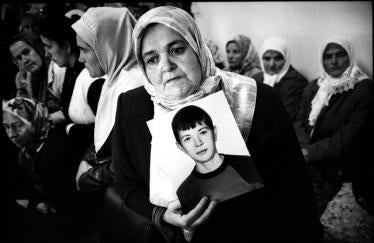Violence Against Women in South Africa
Photo: A woman holds a photo of her missing son as Bosnian Muslim relatives of the victims and survivors of the Srebrenica massacre meet with Dutch former peacekeeping troops. © 2007 Reuters

The fall of the town of Srebrenica to Bosnian Serb forces in July 1995 made a mockery of the international community's professed commitment to safeguard regions it declared to be “safe areas.” U.N.
In March and May 1995, the Human Rights Watch Children=s Rights Project conducted an investigation in Louisiana into the conditions in which children are confined in that state, examining the human rights aspects of their incarceration.We found that substantial numbers of children in the state training institutions are regularly physically abused by guards, are kept in isolation for long periods o